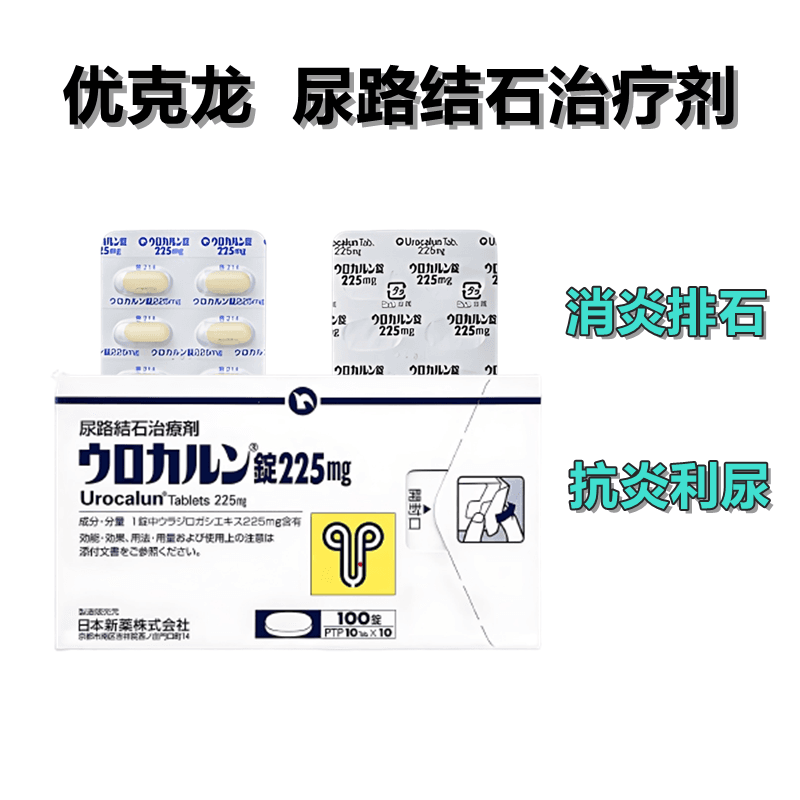Made from natural plant ingredients, it gently helps you get rid of those pesky “little stones” inside your body.
In the urology department, a middle-aged patient sits pale-faced and sweating profusely. After reviewing the test results, the doctor says:
“It’s a kidney stone. Fortunately, it’s not too large — let’s try medication to help pass it.”
Then he hands the patient a box of a Japanese medicine called Ukuron.
A few weeks later, the patient returns with a smile:
“The stone actually passed!”
This medicine is widely used in Japan — so what makes it special?
Let’s take a closer look.

Urocalun Tablets 225mg – 100 Tablets
For Kidney Stones & Urinary Tract Stones | Non-Surgical Stone Treatment
What is Ukuron?
Ukuron is a medication developed by a major Japanese pharmaceutical company, specially designed to treat urinary tract stones. Its formula draws inspiration from traditional medicine and the use of natural plant-based ingredients.
It has been sold in Japan for decades and is commonly used by doctors to treat small to medium-sized kidney stones and ureteral stones.
Unlike strong chemical drugs, Ukuron relies mainly on natural plant extracts to gently improve the urinary system environment, helping the body naturally pass out the stones. This provides a non-surgical treatment option for many patients who wish to avoid invasive procedures.
Main Ingredient: The Power of Natural Plants
The key active ingredient in Ukuron is Quercus Salicina Extract Powder (also known in Japanese as ウラジロガシエキス).
Each tablet contains 225mg of this extract, which comes from the branches and leaves of a type of oak tree highly valued in traditional medicine.
In addition to the main ingredient, the tablet also contains several other components to help with absorption and tablet stability:
Lactose
Corn starch
Magnesium stearate
Talc
Hydroxypropyl methylcellulose (HPMC), etc.
The tablets are light yellow, oval-shaped, and moderately sized—easy to swallow.
How Does Ukuron Help Pass Stones?
Ukuron helps eliminate stones through several gentle but effective mechanisms:
✅ Prevents stone growth – inhibits crystals from aggregating into larger stones
✅ Helps dissolve certain types of stones – mild dissolving effect on some stones
✅ Reduces inflammation – soothes irritation caused by stone movement
✅ Increases urine output – promotes urination to flush out stones
Some studies suggest Ukuron is particularly effective for ureteral stones, though it also benefits patients with kidney stones. Clinical evaluations in Japan have shown it can be an effective aid in passing stones.
Dosage and Usage Instructions
How much to take: 2 tablets per dose, 3 times daily (total 1350mg/day)
When to take: Preferably after meals to reduce stomach discomfort
Duration: Usually taken for several weeks, or as directed by your doctor
Special Precautions for Certain Groups
Elderly: May require dose adjustments depending on physical condition
Children: Not enough safety data available; should be used only under medical supervision
Pregnant or breastfeeding women: Use only if clearly needed and after risk-benefit evaluation by a doctor
Missed a Dose?
If it's early: take the missed dose as soon as you remember
If it's close to the next dose: skip it and take the next one on schedule
⚠️ Do NOT double the dose to make up for a missed one
Is Ukuron Safe? Any Side Effects?
Overall, Ukuron is considered safe and well-tolerated, but some people may experience:
Mild stomach discomfort (bloating, nausea, poor appetite)
Diarrhea
Dry mouth
Constipation
Important Usage Reminders
⚠️ Do NOT swallow the tablet with its blister packaging!
Always remove the tablet from the aluminum foil. Swallowing the packaging by mistake can cause serious injuries like esophageal tears.
Dietary & Lifestyle Tips While Taking Ukuron
? Drink plenty of water – At least 2000ml/day to help flush out stones
? Avoid high-oxalate foods – such as spinach, peanuts, strong tea
? Limit high-protein foods – such as organ meats and seafood
⚠️ Be cautious with other medications – especially blood pressure meds, diuretics, vitamin D, and calcium supplements, which may promote new stone formation
Other Lifestyle Habits That Help
Stay hydrated: adequate water intake is the most important step in passing stones
Eat less salt: keep daily salt intake under 6g
Get active: gentle movement or jumping can help move the stone downward
Go for regular check-ups: ultrasound or other imaging to monitor stone progress
Frequently Asked Questions
Q: Can Ukuron treat all types of kidney stones?
A: It’s most effective for small stones (usually under 1cm), especially stones made of uric acid or calcium oxalate.
For larger stones or those causing serious symptoms like hydronephrosis or infection, surgery may be necessary.
Q: How long does it take to see results?
A: Many patients pass stones within 2 to 4 weeks, but it varies.
If there's no improvement after a month, or symptoms worsen, consult a doctor immediately.
Q: Can I take it after surgery?
A: Yes, Ukuron is often used after lithotripsy (stone-breaking surgery) to help remove residual fragments.
Final Thoughts
Some Japanese urologists say Ukuron shows how herbal medicine can play a useful role in modern treatments, especially for patients with small stones.
As research into plant-based therapies continues to grow, traditional remedies like this are gaining renewed attention.
But always remember: consult your doctor before and during any kidney stone treatment.
Regular monitoring (such as ultrasound) is essential. Don't assume you're cured just because you're taking medication.
On the journey to treating kidney stones, Ukuron offers an important reminder:
You don’t always need aggressive treatment—gentle, natural options can also work.
